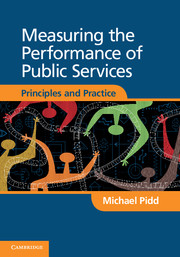Book contents
- Frontmatter
- Contents
- List of figures
- List of tables
- Preface
- Part I Principles of performance measurement
- Part II Different uses for performance measurement
- 3 Measurement for improvement and planning
- 4 Measurement for monitoring and control: performance management
- 5 Measurement for comparison
- 6 Measurement for accountability
- Part III Practical methods for performance measurement
- References
- Index
4 - Measurement for monitoring and control: performance management
from Part II - Different uses for performance measurement
Published online by Cambridge University Press: 05 June 2012
- Frontmatter
- Contents
- List of figures
- List of tables
- Preface
- Part I Principles of performance measurement
- Part II Different uses for performance measurement
- 3 Measurement for improvement and planning
- 4 Measurement for monitoring and control: performance management
- 5 Measurement for comparison
- 6 Measurement for accountability
- Part III Practical methods for performance measurement
- References
- Index
Summary
Introduction
Chapter 2 suggested several reasons for measuring the performance of public services and here we consider measurement for monitoring and control. Managers do many things in their working lives, but their fundamental task is to get things done, usually by working with other people and other organisations. Getting the correct things done through other people is the essence of management. This involves deciding what should be done, which we often think of as planning, and then ensuring that things run to plan; or changing tack if that is appropriate. Ensuring that things run to plan, or changing tack if necessary, is the essence of management control. This can be exercised in many different ways; some are heavy handed, some have a light touch, some use formal mechanisms, some use informal and implicit control. However it is done, there will be some form of control in any organisation, including public sector bodies, and here we consider the part that performance measurement plays in this.
Performance management is sometimes wrongly equated with performance measurement, but there are many uses for performance measurement as suggested in Chapter 2. Performance management is usually based on key performance indicators to monitor how well an organisation or individual is operating so that appropriate action may be taken. Control is clearly an important feature of both public and private sector organisations. Financial control is probably the most common form of control. It includes budgetary control and financial audit, subjects with which accountants have long been concerned. Budgets typically cover the financial resources available for use and the expected financial or volume returns from using those resources. Managers in most organisations are given regular reports of their performance against these budgets so that they can act to reduce costs, increase revenue or whatever is appropriate. As well as their role in devising and running budgetary systems, accountants also play a major role in auditing, which started as a way for principals to check that their agents (see the brief discussion of principal:agent theory in Chapter 1) were properly discharging their duties. Thus, annual reports from public companies include a statement from an auditor stating whether the accounts and records meet specified standards.
- Type
- Chapter
- Information
- Measuring the Performance of Public ServicesPrinciples and Practice, pp. 81 - 108Publisher: Cambridge University PressPrint publication year: 2012

